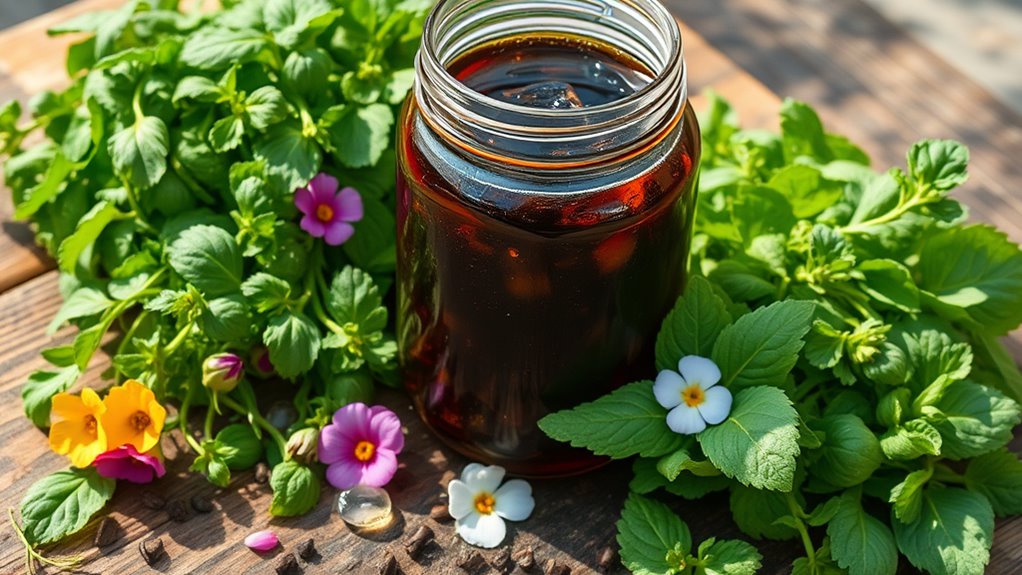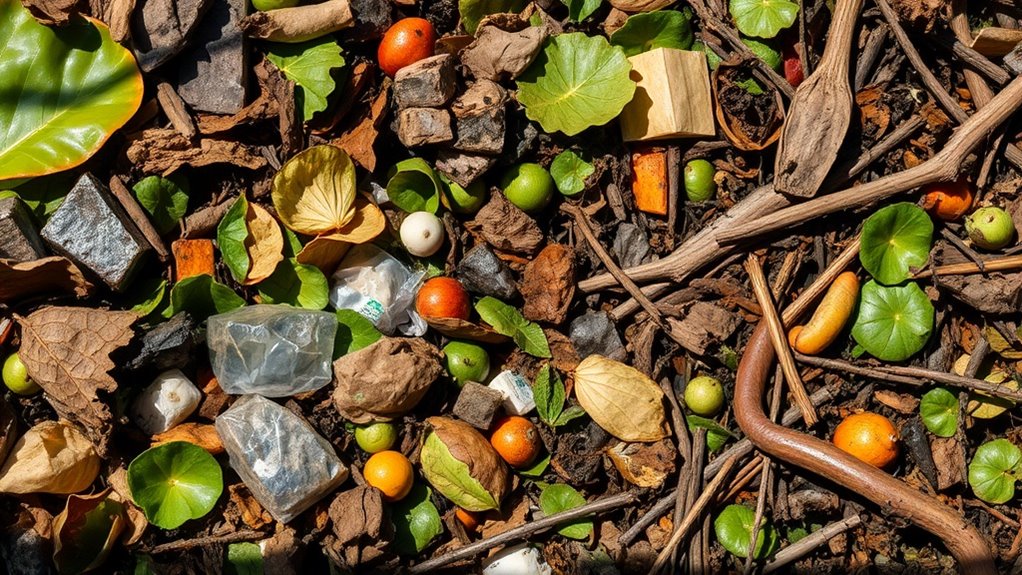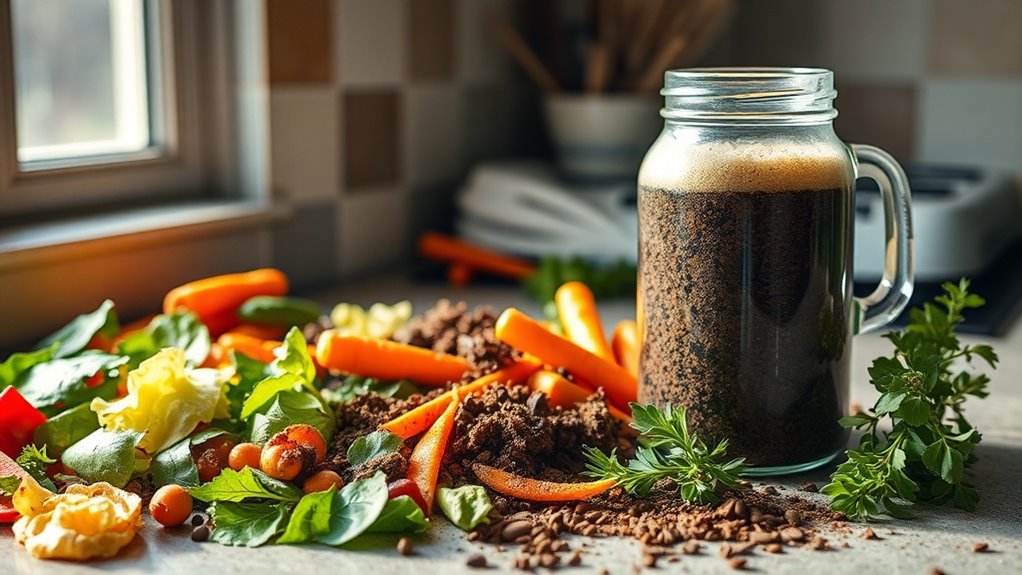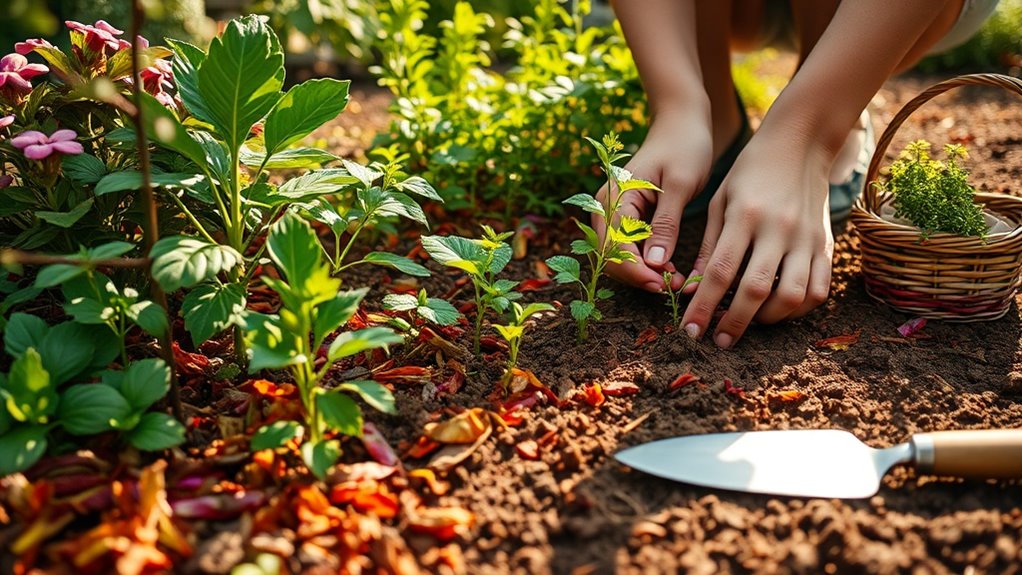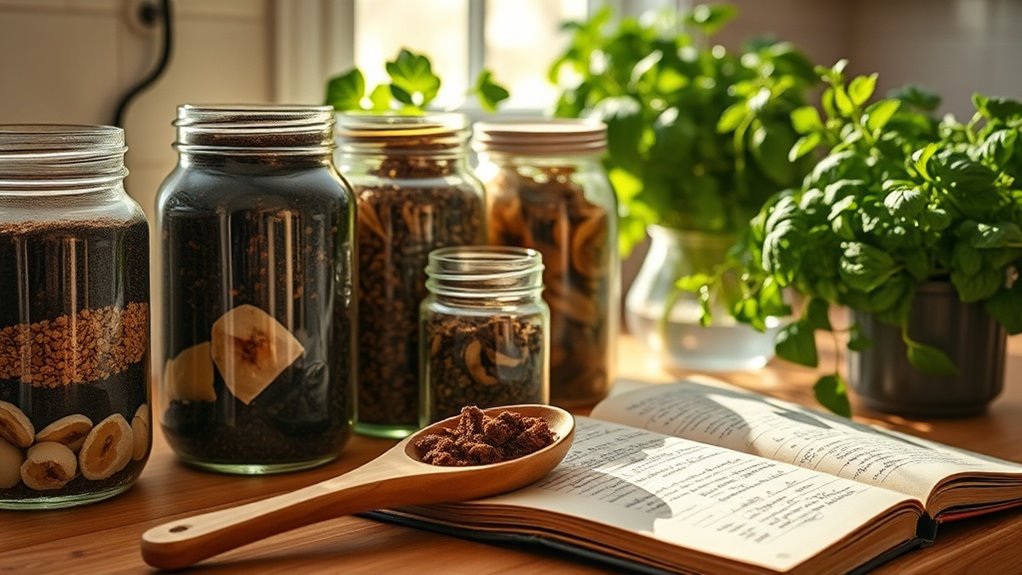Make Compost Tea and Supercharge Your Plants Naturally
If you want to boost your garden’s health naturally, compost tea can be a game changer. This nutrient-rich liquid not only enhances soil fertility but also strengthens your plants’ defenses against pests and diseases. By using simple ingredients and a straightforward brewing process, you can create a powerful elixir that benefits your plants. Curious about how to make it and apply it effectively? Let’s explore the essential steps and tips to ensure your plants thrive.
Key Takeaways
- Use high-quality, well-aged compost and non-chlorinated water to create nutrient-rich compost tea for your plants.
- Brew compost tea by aerating the mixture for 24 to 48 hours to promote beneficial microbial growth.
- Dilute the compost tea with water in a 1:1 ratio before applying it to avoid over-concentration and enhance absorption.
- Apply the tea using a watering can or spray bottle during early morning or late afternoon for maximum effectiveness.
- Reapply compost tea every 2-4 weeks to maintain plant health and boost nutrient uptake naturally.
Understanding Compost Tea and Its Benefits
Compost tea is a nutrient-rich liquid made by steeping compost in water, and it’s gaining popularity among gardeners and farmers alike for its numerous benefits. This powerful brew acts as a natural fertilizer, promoting healthy plant growth and enhancing soil structure. When you follow a simple compost tea recipe, you’ll provide your plants with essential microbes and nutrients. Using compost tea can improve plant resilience against pests and diseases while boosting overall vitality. You’ll find that applying this liquid gold not only nourishes your garden but also fosters an environmentally friendly approach to gardening. Additionally, compost tea can enhance soil health by introducing beneficial microorganisms that support plant growth. Your plants will thank you!
Essential Ingredients for Compost Tea
To create effective compost tea, you’ll want to start with high-quality compost, as it provides essential nutrients and beneficial microbes.
The type of water you use also plays a crucial role; avoid chlorinated water, which can inhibit microbial growth.
Finally, incorporating aeration techniques will ensure that your tea is rich in oxygen, promoting a thriving environment for those beneficial organisms. Additionally, using fast composting techniques can help you produce nutrient-rich compost in a shorter time frame, enhancing the quality of your compost tea.
Quality Compost Selection
Selecting the right compost is crucial for creating effective compost tea that nourishes your plants.
Look for compost rich in diverse organic materials, like kitchen scraps, yard waste, and green manure.
Avoid compost made from treated wood, plastics, or synthetic chemicals, as these can harm your plants.
Check for a dark, crumbly texture and earthy smell, indicating a healthy decomposition process.
Ideally, your compost should be well-aged, at least six months old, to ensure beneficial microorganisms are present.
When in doubt, opt for compost from a reliable source, like a local farm or trusted supplier, to guarantee quality ingredients for your tea.
Water Type Matters
The type of water you use can significantly impact the quality of your compost tea.
Tap water often contains chlorine and other chemicals that can harm beneficial microbes.
Instead, opt for rainwater or filtered water, as they’re free from harmful additives.
If you must use tap water, let it sit out for 24 hours to allow chlorine to dissipate.
Additionally, consider the pH level; slightly acidic water (around 6.5 to 7) is ideal for microbial activity.
Always use water that’s at room temperature to help activate the nutrients, ensuring your compost tea is as effective as possible for your plants.
Aeration Techniques Explained
How can you ensure your compost tea is teeming with beneficial microbes? Aeration is key!
Use an aquarium pump with air stones to introduce oxygen into your brew.
This process boosts microbial activity, creating a thriving ecosystem.
Aim for 30-48 hours of aeration, stirring occasionally to enhance oxygen distribution.
If you prefer a simpler approach, gently stirring the mixture every few hours can also work, though it’s less effective.
Remember, keeping the temperature between 65-75°F helps microbes flourish.
Finally, always use high-quality compost to kickstart the microbial population and ensure your plants receive the best nutrients from your tea.
Step-by-Step Guide to Making Compost Tea
To make your own compost tea, you’ll need a few essential ingredients and a clear brewing process. First, gather your materials, then follow the steps to brew your tea effectively. Additionally, using easy home composting can enhance the quality of your compost tea. Finally, learn the best techniques for applying it to your plants for maximum benefit.
Essential Ingredients Needed
Creating your own compost tea requires a few essential ingredients that work together to brew a nutrient-rich solution for your plants.
Start with high-quality compost, preferably from a balanced mix of kitchen scraps and yard waste, to provide beneficial microbes.
You’ll also need non-chlorinated water, as chlorine can harm microbes.
A breathable bag, like cheesecloth, helps contain the compost while allowing nutrients to seep out.
Add molasses or unsulfured sugar to feed the microbes during brewing.
Optional ingredients include seaweed or fish emulsion for added nutrients.
With these components, you’re set to create a powerful elixir for your garden!
Brewing Process Explained
Brewing compost tea can be broken down into a straightforward process that maximizes the benefits for your plants.
First, gather your ingredients: well-aged compost, water, and an optional aeration device.
Next, fill a container with water, preferably chlorine-free.
Add about one part compost to five parts water.
If you’re using an aerator, place it in the mixture to promote oxygenation.
Let it brew for 24 to 48 hours, stirring occasionally.
After brewing, strain the tea through a mesh or cloth to separate solids.
Your compost tea is now ready to use, providing nutrients and beneficial microbes for your plants!
Application Techniques for Plants
Once your compost tea is brewed and strained, it’s time to put it to good use in your garden. You can apply it using a watering can, spray bottle, or directly into the soil. Here’s a quick guide to help you get started:
| Application Method | Best Use |
|---|---|
| Watering Can | Soil drenching |
| Spray Bottle | Foliage feeding |
| Direct Injection | Root zone boost |
Remember to dilute the tea with water if it’s too concentrated. Apply every 2-4 weeks during the growing season for optimal results!
Different Brewing Methods for Compost Tea
There are several effective methods to brew compost tea, each offering unique benefits depending on your gardening needs.
The simplest method is steeping, where you soak compost in water for 24 to 48 hours, stirring occasionally.
For a quicker option, try the aerated method, using an aquarium pump to introduce oxygen, enhancing microbial growth in just 12 to 24 hours.
You can also use a tea bag approach, placing compost in a porous bag for easier handling and cleanup.
Each method has its own advantages, so pick the one that best fits your schedule and desired potency for your plants. Additionally, accelerating compost decomposition can further improve the quality of your compost tea by enriching it with beneficial microorganisms.
How to Apply Compost Tea to Your Plants
Start by diluting the tea with water, aiming for a 1:1 ratio.
Using a watering can or sprayer, apply it directly to the soil, ensuring you soak the root zone.
For foliar applications, spray the tea onto the leaves early in the morning or late afternoon to avoid sunburn.
Make sure to cover both the tops and bottoms of the leaves.
Reapply every two to four weeks during the growing season, especially after rain or watering, to keep your plants thriving and healthy. Additionally, using compost tea can enhance microbial activity in the soil, further benefiting your garden’s ecosystem.
Tips for Maximizing the Effectiveness of Compost Tea
To truly harness the benefits of compost tea, consider a few practical tips that can enhance its effectiveness.
First, use fresh compost to brew your tea, as older compost may lose nutrients.
Make sure to aerate your tea to promote beneficial microbial growth; a simple aquarium pump works great.
When applying, aim for early morning or late afternoon to prevent evaporation and maximize absorption.
Dilute your compost tea with water, typically at a 1:1 ratio, to prevent over-concentration.
Finally, apply it regularly, about every two weeks, to keep your plants healthy and thriving. Additionally, consider incorporating natural ingredients from your garden waste to further boost the nutrient content of your compost tea. Happy gardening!
Troubleshooting Common Issues With Compost Tea
When brewing compost tea, you might encounter some common issues that can affect its quality and effectiveness.
Here are a few problems and their solutions:
-
Offensive Odor: If your tea smells foul, it likely hasn’t aerated enough. Increase aeration or reduce brewing time.
-
Cloudy Appearance: A cloudy tea may indicate excess sediment. Strain the tea better before use to improve clarity.
-
Inconsistent Results: If your plants aren’t thriving, check the compost source. Ensure it’s mature and free from contaminants. Maintaining odor-free composting practices can help improve the quality of your compost tea.

